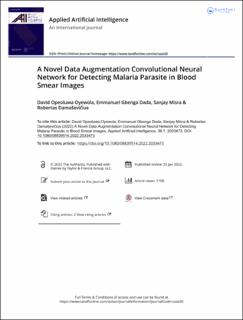A Novel Data Augmentation Convolutional Neural Network for Detecting Malaria Parasite in Blood Smear Images
Peer reviewed, Journal article
Published version
Permanent lenke
https://hdl.handle.net/11250/3032526Utgivelsesdato
2022Metadata
Vis full innførselSamlinger
Originalversjon
Applied Artificial Intelligence. 2022, 36 (1), Artikkel e2033473. 10.1080/08839514.2022.2033473Sammendrag
Malaria fever is a potentially fatal disease caused by the Plasmodium parasite. Identifying Plasmodium parasites in blood smear images can help diagnose malaria fever rapidly and precisely. According to the World Health Organization (WHO), there were 241 million malaria cases and 627 000 deaths worldwide in 2020, while 95% of malaria cases and 96% of malaria deaths occurred in Africa. Also in Africa, children that are less than five years old accounted for an estimated 80% of all malaria deaths. To address the menace of malaria, this paper proposes a novel deep learning model, called a data augmentation convolutional neural network (DACNN), trained by reinforcement learning to tackle this problem. The performance of the proposed DACNN model is compared with CNN and directed acyclic graph convolutional neural network (DAGCNN) models. Results show that DACNN outperforms previous studies in processing and classification images. It achieved 94.79% classification accuracy in malaria blood sample images of balanced class dataset obtained from the Kaggle dataset. The proposed model can serve as an effective tool for the detection of malaria parasites in blood smear images.

